#this happens OFTEN with racism episodes in Trek
Explore tagged Tumblr posts
Text
Repentance is an episode that kind of hits what I think it was trying to say but then also. completely and utterly fails in other areas. which is characteristic of a lot of these types of Trek episodes tbh
#star trek: voyager#where they did a pretty good job: the guy that Seven bonded with that made an appeal#its. a bit tricky because of how they depict the mental illness aspect imo#because they do lean a bit too much into trying to absolve him of responsibility#I think the character himself had it the best in that he took full responsibility for what he did and didnt try to excuse himself#even if he wasn't fully in control of himself he is still responsible for his actions and the hurt he caused#and I like that he was the first to acknowledge and refused to absolve himself#then theres the guy Neelix bonded with#I was really excited especially when they brought up how his race made up 10% of the population but represented 80% of prison population#I thought we were gonna get some great commentary on the prison system#but in the end they didnt follow through#and to make it even worse they completely villainized the dude#so in the end the narrative isnt empathetic towards him or the others being sent to be executed#its only empathetic towards the one Seven bonded with#this happens OFTEN with racism episodes in Trek#where they kind of hit or almost hit#but then theres always something that just. completely misses the mark
2 notes
·
View notes
Note
read your criticism and have a genuine question about your thoughts on the branding scene. i completely understand how max's branding is inherently tied to a racist history, and it always will be, but i dont feel like the scene itself was written with that bias/intent. thaddeus also gets branded in later episodes and it's implied to happen to every aspirant upon their promotion. at what point in writing are black characters morally barred from specific story points because of their similarities to a history that's not directly related? sort of similar with barb, at what point can black characters not do bad things at all, especially in a story where there are near a dozen non-black characters who do worse things? also considering it's implied (at least, i understood it as) she's sticking to vault-tec to protect her family?
I am not in the best position to comment on this, because I am not black. I will do my best to add what I can, but this is a space for others to chime in.
Barb is interesting because she's essentially become the person who did the most heinous crime in the entire setting- by far and away worse than anything anyone has ever done. There really aren't white characters who did worse things- because all the crimes of Caesar or the Enclave or whoever else pale in comparison to being the one who literally set into motion the total annihilation of all nations on Earth. (This is setting aside her willing participation in the inception of the vault experiments- which is an entirely separate also horrific crime.)
The issue is they've created a setting that is, as presented, colorblind. Race is invisible to the writers, who did not consider it meaningfully while producing the show- as is often the case with white creatives putting characters of color into their stories. Colorblindness does not always produce entirely racist results- and when done with tact and intentionality it can even be revolutionary. Look at the relative inclusivity of star trek as an example, and the radical depiction of Uhura in the original series.
The thing that makes Fallout different from Star Trek however is that it is not depicting its colorblind future with tact and intentionality. This is a show that is intensely concerned with depicting the specific brand of nationalistic American politics of the 1950s and the Cold War- and they've reproduced that system for the show but with a black woman at the head. That's where the issue comes up.
This was a system that had racism baked into it by design. It still does. American Nationalism and corporate violence are built on racism against black people and other minorities. And this show desperately wants to depict these things, but they've decided to put a black woman at the head of them. They're depicting systems that are, by their nature, violently racist- but they've decided to portray them as being run by a black housewife.
Fallout 3 does a similar thing with how it depicts every major slaver as a black person. Eulogy Jones, the slave buyer at Paradise Falls, the head slaver in the Abe Lincoln memorial, Ashur in The Pitt. Hell Mothership Zeta adds in a black woman from the wasteland and even SHE'S revealed to have been a slaver. This is something Bethesda consistently does- depicting ideologies and practices with a deep history of racialized violence- and then showing black people at the head of them, seemingly to try to avoid actually addressing any aspect of racism in their stories outside of hamfisted metaphors like synths and ghouls. (I use Fallout 3 as an example but Fallout 4 does many of these same things.)
Thaddeus does also get branded, and he does also get treated to the same demeaning servanthood as Maximus. The difference, quite frankly, is that Thaddeus is white. There are just some things that are straight up inappropriate to depict happening to black characters without appropriate thoughtfulness and context. Never before this series has the Brotherhood ever done brandings- and yet this show opens with it in the first episode and introduces this brand new jarring concept with the visceral image of a black man being branded by faceless fascist cultists.
It's also important to note that even if they didn't intend the scene as racist, it still is. Like I don't think the scriptwriter sat down and said "oh I'm gonna do a racism" cuz intent just doesn't matter here. The scene was intended as a way of showing the severity of the brotherhood- but it also thoughtlessly reproduces images of historic black violence.
@orange-coloredsky I know you've been talking about this stuff all day, and your initial posts about the antiblack racism in the series were what prompted me to write my thoughts today- which is what this ask is in response to. I was curious if you have any other input with all this.
I'd also be more than happy to have any additional input from people better suited to answer these questions.
240 notes
·
View notes
Note
What do you mean by mtmte being more like fanfiction /gen?
Of course not all fanfictions are flawed, but in my opinion MTMTE/LL has all the same issues that plague a lot of fanfiction and especially TF fanfic:
Despite being a story mainly about robots, they have severe racist themes in their plotlines. A lot of TF fanfics make broad essentializing statements about transformers with certain frame-types, who have certain home city-states, etc. and are written with the idea that these are facts. A lot of the time, the themes are related to real-world racism, like having all the Black-coded transformers characters being naturally prone to violence. James Roberts's MTMTE/LL also does similar things and its plotline is deeply and largely unquestioningly racist. I hate typing her name, but Mengel is probably my go-to example of racist themes in this series. (Ableism too is often in TF fanfic, and MTMTE/LL has some of the most ableist themes in TF).
A lot of fanfics have unnatural character and relationship growth because they're written to be wish-fulfillment. MTMTE/LL features in my opinion many major characters who don't develop naturally, but instead suddenly change in characterization without buildup, and relationships that feel forced. A really clear example would be with CDRW, a relationship that was extremely toxic and uncomfortable to watch for a long time, but then suddenly became very supportive and affectionate with the second Rewind almost out of nowhere! Another really good example might be how the mutiny was handled.
High levels of edginess. Fanfic often skews darker than the source material, and MTMTE/LL falls into the bad camp of not necessarily using that to explore interesting themes, but instead to be as gratuitously gory and offensive as possible. I made a post about the tropes JRo used for the villainous characters that sorta explains this. JRo threw in a lot of things like addiction into his stories seemingly without having a clear understanding of the implications.
A lot of fanfics like to explore tropes with preexisting characters, and I swear the majority of MTMTE/LL's plot points feel like JRo was copying stuff he saw in episodes of Star Trek or Doctor Who. A lot of the time things just kinda happen in MTMTE/LL without feeling like they were natural developments in the story, too, as if JRo was skipping over anything he wasn't personally interested in.
#The cinnamonrollification of Tailgate over the course of the series also speaks to this IMO#transformers idw#negative#my analysis
9 notes
·
View notes
Text
something i have been having a lot of fun with lately is making bingo cards for shows im watching and i think more people should try it lmao
what you do is this: find an online bingo card maker, there are a few of these but i use bingobaker. get it up on your phone. make a bingo card filled with things that happen often in the show. this can be specific things (e.g. a certain prop being used) or more subjective things (e.g. [character] says something iconic). as you watch the show, generate a new randomised bingo card for each episode you watch and play along! see how many bingos you get
some examples of stuff i have on my supernatural bingo card: destiel moment, sam has his sleeves rolled up, cas jumpscare, "son of a bitch"
some examples of stuff i have on my star trek tos bingo card: phasers / communicators not working, kirk throws hands, predictable plot twist, fake looking planet set, Vulcan racism
i think its really fun to come up with stuff and see how often they actually happen. some of them you will be ticking off every other episode, some will be way less common than you thought they were!
if you try this pls lmk and tell me some of your favourite bingo squares :)
28 notes
·
View notes
Text
whoops, i almost forgot about the star trek update. tuesday we watched tng's "firstborn" and "bloodlines" and last night we watched ds9's "the wire" (honorific)
firstborn (tng):
i was actually bracing for this one to suck ass bc everyone says worf is a bad dad. and i dont think he is!!! like, it doesn't come as easily to him as it does to sisko, and he sometimes forgets to be gentle or kind with alexander because he's so laser focused on how things SHOULD be he forgets to the importance of taking others' feelings into account, but that's how he is ALL THE TIME with EVERYONE not just his kid. considering the circumstances i'd say he's doing well
before we get started, GREAT cameo from the duras sisters. i was initially really annoyed with their tit windows but im becoming rather fond
i really liked "the family protector guy "k'mter" at first because he said all the right things to alexander...like, it's scary not being able to defend yourself, etc. then he also was a dick to alexander and i was really exasperated...but then he IS alexander so that totally fixes it. he's angry with himself and conflicted and just wants a HUG FROM HIS DAD and that FIXED it!!! like when he said "nobody will look at you and see a human you are alone on this ship" initially it felt like racism but it being like, not quite self-loathing but just bitter experience...that's actually so clever
this is the only episode where they brought up alexander's mom kind of hating ""klingon stuff"" and how that could possibly have negatively impacted him and it only got two lines of dialogue but still. i think it's really damning that she hated her own heritage and also brought her kid up to hate it and now he's sort of out here...pretending to be human, almost, to the point where he doesn't want to participate in hsi own culture or even bond with his own father (a klingon). like it sucks so bad for him
i was afraid that the plot twist would be "k'mter talks alexander into wanting to be a warrior after all just when worf realizes he doesn't have to be" which would have been sad but a real "oh shit" of an ending. mixed feelings about them not doing that but i understand why they wanted to properly wrap things up for s7
i almost forgot but rare w for picard for bending the rules a little bit to give worf time to go to the klingon festival with his kid. credit where it is due
bloodlines (tng):
i have never been so BITTERLY DISAPPOINTED.......................
they gave. picard. an affair baby.
THEY GAVE HIM AN AFFAIR BABY!
what have i been saying since farpoint! he has an affair baby! AND THEY GAVE HIM ONE
AND THEN TOOK IT AWAY
what was the POINT OF THE EPISODE
if that's not his fucking affair child
pussy ass little FUCKS couldnt commit to changes...
i can't even remember what else happened in this episode i was so disappointed about this plot twist
oh yeah actually i do remember picard made a bald joke which i THINK was the only time he's done that in seven seasons? i think the only time ANYONE'S done it? please correct me if i am wrong but i was so shocked it got a big laugh out of me. also a rare w for picard. if he made bald jokes more often i'd hate him less maybe
oh yeah i'm coming back to add this later but it was really hilarious that picard was so torn up over his not-son being a little criminal. his horrific unforgivable spelunking crimes. so true.
the wire (ds9)
ooohhhhhhhhhhhh my god. oh my GOD. let's fucking...get into it
i rly thot garak was just a guy but not only is he a former assassin he's a current junkie. A JUNKIE! he's just like me fr
also, he can act? like that scene where he was withdrawing and saying horrible shit to julian......i was on the edge of my seat.
i love that he gave us 3 different stories about how he got kicked out. i'm gonna be honest, i looked it up, and apparently we never find out the truth? that is a bold fucking move. a daring choice. we, like julian, will never have any certainty. like, sure, i WANT to believe he released some kids from being tortured, but it's also equally as likely that he killed civilians or did a number of other horrible things
like, the fact that he can lie about it even while under significant distress.........king. like you could say oh that's the true one because that's the one where he was physically unwell but he also referred to "elim" in that one which gives it the ring of a potential falsehood
julian forgiving him anyway, even after all the horrible stuff he said, even after being physically ATTACKED (WHICH WAS SCARY!!! i was scared of him!!!!!) for "whatever he did," just because garak said "i need to know someone forgives me"..........AUGHGHGH JESUS CHRIST
THE FACT THAT HE WON'T TALK ABOUT IT. he won't tell even US what he did. eliot spencer core actually. i am beside myself about it all
maybe he's right and it is all true. maybe he destroyed a ship and framed a friend AND let some kids go. it's literally none of business though like he's not gonna tell us
anyway, i heard the term "brain implant" and nearly died on the spot, so 10/10 episode
honestly, they should have just upgraded this guy to a regular. he is so good
NEXT TIME: tng's "emergence" and ds9's "crossover" AND YES I KNOW THAT'S MIRRORVERSE!!!!!!!!!!!!!!
16 notes
·
View notes
Note
Send me a Trek character and I’ll reply with a question I would ask them — and, if you want, my hoped-for answer!
Yay, ladies! Any or all of these!
Kathryn Janeway
Beverly Crusher
Una Chin-Riley
Thank you for asking, anon! ❤️
Okay, no thoughts, just knee-jerk questions and answers.
I would ask Kathryn Janeway what it felt like to finally be home.
By my reckoning, Janeway may be in a form of shock when we last see her in her command chair (which I think is believable, btw — a big smile would have been too weird) and I’m curious to know what was going on in her head.
What I hope Janeway would say in reply is something along the lines of disbelief. Not that she didn’t think she was home, but that a plan to get home actually worked. Janeway had dealt a devastating blow to one of the Federation’s biggest threats and arrived home in a fireball of victory … and loss. Because she lost something out there, was about to lose her crew, could she lose some of her guilt, what happens next? Her days had been a drumbeat of responsibility and, while there were sure to be briefings and such, Janeway’s sole responsibility for her crew was now shared with the larger Starfleet apparatus she had been trained to depend on but had been without for so long. So I hope she would tell me about those mixed feelings, a swirl of loss and gain that hurt her brain as the heat of her fireball of victory cooled.
Then I hope she would tell me how she ordered the ship to land on the front lawn of Starfleet Command and, after following proper procedures, she exited down the gangplank and touched the Earth-earth she had missed for so long.
So that’s Janeway.
I would ask Beverly Crusher what Beverly hopes to gain in her life.
Looking solely to TNG Beverly, I feel like Beverly is a character defined by loss — loss of her parents, of her husband, eventually of her grandmother — and that loss permeates her decision-making, her morals, and her fears. “Remember Me” is an episode about how fear of loss can affect a person and how loss defined Beverly’s reality.
So I would hope Beverly would say that she’s already gained so much — a job she loves and excels at, a ship where she can be with her son, a familial love for many of her crewmates, and the ability to help people all over the galaxy. I would hope Beverly would see herself differently from the way I too often see her (and the way I perceive the writers as seeing her) and I would hope Beverly would see and value her everyday gains, even though the losses are there, too.
So that’s Beverly.
I would ask Una Chin-Riley what it’s like to remember. Because there have to be times that Una forgets she’s Illyrian and feels like just another member of the crew, sharing a meal with an Andorian or chatting with a Bolian. So much acceptance and respect for differences … but not when it comes to Illyrians. Una is a special case and only allowed in Starfleet as an exception.
So I would hope Una would say remembering makes her angry — not sad — but that knowing she’ll be on the future Starfleet recruitment poster helps ease the pain of racism against her people. Una is an exception for now. But not forever. Appreciation for differences will win out … eventually.
Thank you again for asking, anon! ❤️
Send me a Trek character and I’ll reply with a question I would ask them — and, if you want, my hoped-for answer.
#i love asks#anon#kathryn janeway#star trek voyager#beverly crusher#star trek the next generation#una chin riley#star trek strange new worlds#oh hai it’s three fictional women i love
12 notes
·
View notes
Text
"ds9 ruined star trek-"
I'm so fucking tired of y'all acting like ds9 was beheading three aliens an episode, Jesus Christ.
Sure, it had its bad random edgelord plots. I for one found section 31 to be boring and often pointless. I found some dominion war episodes to be bleh.
But for every fucking..."siege of ar-558," there was an "it's only a paper moon."
Look me in the fucking eye and tell me that it's only a paper moon wasn't a beautifully humanistic and thoughtful story about how someone comes back from losing a limb and copes with PTSD and survivors guilt and then tell me that all of ds9's grittier stories "weren't really star trek."
You seem to forget that tng wasn't just a quirky fun little romp through space either. It often talked about ableism, prejudice, bigotry, and ALSO.
It was the show that INTRODUCED the fucking Cardassian occupation.
Ds9 just went through with that dark ass concept! And it was written in the fucking 90s, when there were a lot of genocides still happening in the fucking world.
Star trek is a hopeful utopian future show, but it's also the "we need to get our shit together" show.
Ds9 had its dark dumb episodes, but it also had the signature star trek twinkle that lit up the darkness.
I absolutely hate people who say oh ds9 wasn't light hearted all the time, that's why it was bad.
The visitor might be one of the most beautiful sci Fi stories ever told and it was heart breaking.
And it wasn't even related to the dominion war that everyone seems to hate.
What about far beyond the stars?
Was challenging 1950s racism in the creative industry too fucking edgy for you?
Jesus.
I hate anti ds9 people, I really do.
You can dislike the show, whatever, but reducing it to purely disliking it because it was dark...
If you're a boomer Trekkie, I especially side eye you because I sometimes wonder if maybe y'all just didn't get the fucking point of star trek anyway.
It was always about fucking politics.
It was always about humanity and creating stories that would encourage us to look at ourselves through the context of aliens that mirror our own flaws.
Arghhhhh.
Boils my blood.
Ds9 is fucking great.
Have better opinions. Get better taste.
14 notes
·
View notes
Text
Ehhh I would not give Profit and Lace the benefit of 'kind of'. It's original concept (a dramatic exploration of Quarks relationship to his mother) is interesting but the way it ended up is a deeply transmisogynistic 'comedy' that hits all the worst tropes
(Guy pretending to be a woman to sleep with someone; estrogen makes you cry too much and it's bad/weird; mocking Rom's effeminacy; Forcing Quark to strip clothes to 'prove' what gender he is)
The fact that transition related surgeries are easily available and quick procedures really doesn't change how awful that episode is, and while I love Jadzia DS9 is... questionable with how it treats transfem (coded) characters? Yes, in context she's not bothered by being called "old man" as a nickname, but the early on commentary about how she "used to be a man" coupled with the only other acknowledgment of transfems being Profit and Lace is deeply uncomfortable. It's also notable that her trans coding imo, is mostly an early seasons thing and is shunted into the background more as time goes on.
I have a complicated relationship to plastic surgery but I definitely agree that it shouldn't be stigmatized inherently. Because like. There are people that need that. Trans people, disabled people, disfigured people. Etc. But under capitalism its also a deeply evil industry that feeds racist beauty standards.
It was intended by Roddenberry (cursed be his name, tbh) that there would be no bald stigma, but ngl, Star Trek often says one thing is true in the Federation and directly contradicts itself. Especially in regards to bigotry and social stigma. And something I generally don't like is when people take the Federation at its word, or W-O-G as actual in universe truth, rather than analyzing what actually happens in Canon. It stymies deeper philosophical and political conversations and social progress by ignoring problems, and ends up essentially implying "these expressions of misogyny and racism and etc aren't actually problems and you shouldn't complain about them irl either".
I kind of hate when people will either actively ignore things that happen in Star Trek or are just wrong about it and use their own misconceptions to make the federation seem more utopian than it is because it supports their political opinions.
I recently saw a guy on tiktok saying that he's glad people are turning around on plastic surgery (i.e., becoming more opposed to it) because the real solution tp the problem that plastic surgery treats is restructuring society in a way that removes harmful beauty standards. He goes on to say that an example of this is Jean Luc Picard being bald in TNG. A lot of people ask why they haven't fixed balding in the future. He says they don't need to fix balding because they've gotten rid of the stigma of being bald
I have beef with this for two reasons:
1. I think restricting or further stigmatizing plastic surgery only serves to hurt trans people. I dont actually disagree that working towards a world without harmful beauty standards is a good thing but letting utopian ideas of how things should be get in the way of people bettering their lives in the imperfect world we currently have isn't actually helping anyone. Furthermore people should be allowed to do what they want with their bodies.
2. That's not even true. It would be cool if Jean Luc was bald just because he liked looking that way, but there is plenty of evidence in the show that that stigma still exists. In the episode Bloodlines Picard makes a joke to his fake son about how hid hairline is going to recede soon. In the episode of voyager where Kes is thrown back in time the Doctor has reprogrammed himself to have hair. In Picard season 3 (I personally dislike this season of the show but its cannon so ¯\_(ツ)_/¯) Jack Crusher asks Jean Luc what age he started to go bald and Jean Luc is like, sooner than you'd like or something like that. I'm sure there are other examples. These are just off the top of my head.
This is sort of verging into tangent territory, but I personally think even in a world where other people's expectations had no bering on the way people feel about themselves, plastic surgery would still exist. It would exist in a more pure form in which people alter their bodies to bring them closer in line to how they would like to look outside of the view of others. When I was a little kid, the episode Profit and Lace was so intriguing to me in a way that I couldn't really put my finger on why. As a transgender adult, I know it was because I wanted that to happen to me. I obviously realize now that episode is transphobic and kinda misogynist but I still think a utopia in which I can go to a doctor and effortless be transformed to look exactly how I want to with minimal risk is more appealing to me than one in which I cannot.
56 notes
·
View notes
Text
Star Trek Discovery highlighting Black Men's mental health
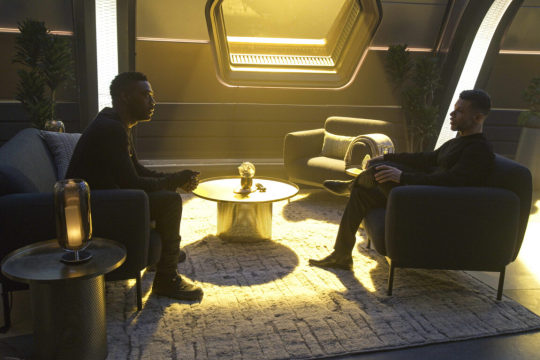
I know DSC prioritizes their female representation, and as a woman, I do appreciate it. But these scenes in season 4 episode 4, All is Possible, with Book and Dr. Culbert are powerful.
1. Seeing a Black man tending to his mental health reflects the current conversation in our community about destigmatizing mental health, especially for Black men. In an article I found about Black men and mental health the author wrote:
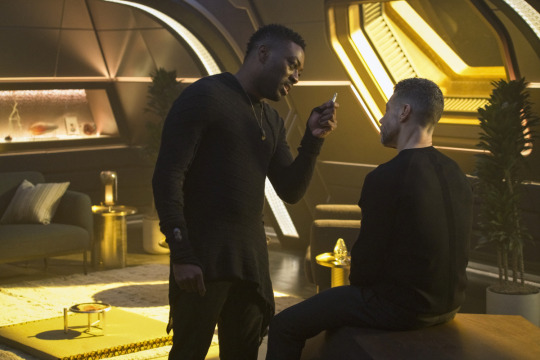
"Black men face a unique challenge in that most of what is most prized about them may be their looks or bodies, but rarely ever their intellect and emotional intelligence. These things are often deemed too soft for any Black man to experience, delivering the message that if you are those things then you must change…and fast." The author continues later on:
"In most instances, Black men have not grown up believing that their internal emotional lives have inherent and productive value. This needs to change." Source:
Season 4 of DSC allows Book, a Black (Kwejian) man, to matter beyond his physical attributes and sex appeal (b/c David Ajala is fine!). The audience is provided an opportunity to go on an emotional journey from a Black man's perspective and ties his mental health to the overall story and plot of season 4, which gives both inherent and productive value to his emotional and mental state.
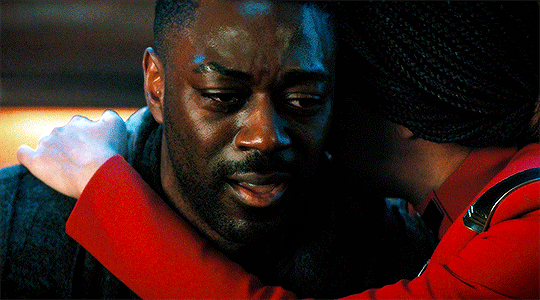
Yes, this is important because the lives and mental health of Black men matter beyond issues like police brutality. IMHO, this is an instance of DSC doing a good job of addressing current social issues and incorporating aspects of Black culture that aren't as universally recongized.
Another aspect that's shown in this episode is Book having access to resources that help him with his mental health. This shows the benefit of people having easy (or easier) access to this form of health care.
2. Seeing a Latino man in a professional position with power and influence is uncommon on TV in the US. Being the ship's therapist is not an easy job, but Dr. Culbert manages it with grace and genuine care. He's one of my favorite characters on show.
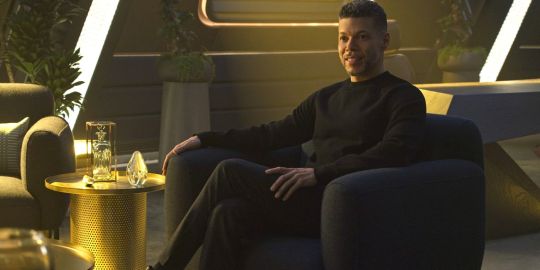
3. I loved seeing a Black man and a Latino man helping each other - and it not be about racism. I also liked seeing Dr. Culbert talk about his Puerto Rican culture as a way to connect with Book regarding Book's Kwejian culture... Now don't get me wrong, I do believe conversations about racism amongst minority groups should happen. I just think it's good that we show people of color having conversations that are centered around other issues.
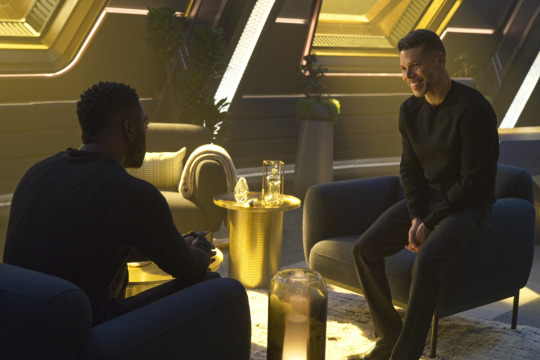
I hope this made sense. It's something I really loved in this recent season of DSC and I didn't see that much conversation about it. So I wanted to throw my perspective out here.
🖖🏿
#i've had this post sitting in my drafts for a WHILE#glad I finally posted it#mental health#black men#cleveland booker#dr hugh culber#star trek discovery#season 4 episode 4#my perspective#star trek#star trek dsc#dsc
25 notes
·
View notes
Text
I've wondered about this, too. With DS9 being the space-version of a major seaport or international airport, where people from all different cultural backgrounds and beliefs mix, you would think that there would be a lot more hate-based crime than the petty theft and other small stuff we see Odo so focused on. If I'm remembering correctly, most of the "attacks" among the civilians of DS9 that we see in the show are related to the fallout of the Occupation, which makes sense, with the station's proximity to Bajor.
The reason why I'm not counting Occupation-related crimes as "hate crimes," in this context, is because one could argue that it isn't bigotry that drives Bajorans to hate Cardassians, and vice versa; war crimes have happened, millions of people died, and anyone who survived the horrors of the Occupation isn't a bigot; they're a victim who is genuinely traumatized, and often seeking retroactive justice, however complicated some of that justice-seeking can be.
I realize that because Star Trek is set in the future, one would hope everyone would be a lot more accepting of differences, and so the show operates on the assumption that most futuristic cultures are not bigoted... but I think it's a missed opportunity to not address the very real issues that could come up in that international space-station environment.
Racism, or rather, species-ism is addressed relatively frequently, especially when it comes to the hatred between the Bajorans and Cardassians, but that's usually, again, related specifically to war crimes/the Occupation/religious differences, and not really related to senseless acts of bigotry (though Far Beyond the Stars is certainly a memorable episode about discrimination and hate crimes, but seeing as those crimes are occurring in an entirely different "setting" and era than DS9, it's sort of beside the point I'm trying to make).
It wasn't until the "Rejoined" episode in season 4, I think, where the threat of senseless hate-based discrimination/violence/bigotry (that is not related to religion/the Occupation) is a major plot point. When Jadzia Dax and Lenara Kahn are reunited, it's explicitly discussed by Kira that she finds the idea of anyone being persecuted for who they love unfathomable. There is a genuine fear in the episode that these two women will be persecuted by their own people, since the episode tells us that there are incredibly high stakes associated with Jadzia "reassociating" with the host of Dax's former wife. Sisko even offers to make sure Jadzia is off of the station while Lenara Kahn is there, so as to completely avoid the risk of her being a target for potential bigotry.
Anyway, I'm not sure any of my thoughts are actually being articulated well, but my point is that I think it would've been great if we'd seen more cross-cultural miscommunications (like when that Cardassian lady thinks O'Brien is flirting with her when they've been fighting non-stop) and/or episodes where the conflict of the story is driven by pure, unexpected, and inexcusable bigotry. No culture, no matter how enlightened, is free of prejudice, and I think it would've made for some great episodes if the every-day activities on the space station required mitigating cultural differences more often.
To bring it back to the original topic, I think if random civilians or tourists on DS9 discovered that the main medical doctor on the space station is a product of illegal genetic engineering/augmentation, there could've been a hell of a lot of unkind words or actions as people tried to wrap their minds around that fact, and I wish the story had "gone there" at least once, so we could see how Julian overcame that struggle.
Honestly kind of shocked by how few (if any??) hate crime garashir fics there are. Like just random people trying to kill Julian after his augment secret gets out and Garak having to covertly (or not so covertly) fuck up people’s shit. DS9 is a way-station/tourist trap, so there are weird people coming in all the time and any one of them could hear about Julian and have Strong Opinions that they feel the need to express. Actually shocked the show didn’t play with this more, either. Julian really got off almost entirely scot-free, and fics are always like, “And everyone loved him anyway,” like??? There are definitely people who did not love him anyway.
86 notes
·
View notes
Text
The Highest of Highs and Lowest of Lows in DS9 S6
by Ames

In a carnival ride full of whiplash-inducing episodes, Star Trek: Deep Space Nine’s sixth season features some of the best episodes and some of the worst episodes in the entire Trek franchise, full stop. So it was a very emotional bunch of weeks for your hosts here at A Star to Steer Her By, and we may just break down and sing about it! And a one, and a two...
In our usual fashion, we’ve determined which of those episodes mark the best of the best and the worst of the goddamn freaking everything in our season wrap-up episode, which you can also listen to here (pertinent discussion starts at 1:25:55). Some decisions were easy (oh so easy) while some were wildcards, and we also had special guest star Liz helping us bolster our favorites and roast our least favorites. Crack open your favorite Benny Russell story and read away!
[images © CBS/Paramount]
Bottom Three Episodes
Wow, there were a lot more clunkers than usual in this season than we were expecting from DS9, but some of them were just so bad that we took it personally.
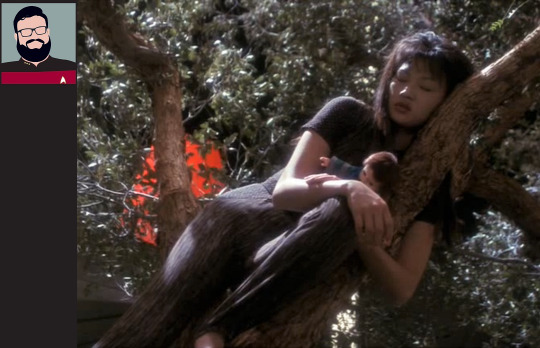
“Time’s Orphan”: Jake For a concept that required a lot of research into child development and psychology, this one sure didn’t show it. But don’t worry: surely if we send this episode to live in the wilderness with no supplies or protection except a hairbrush, everything will turn out just fine for everyone!
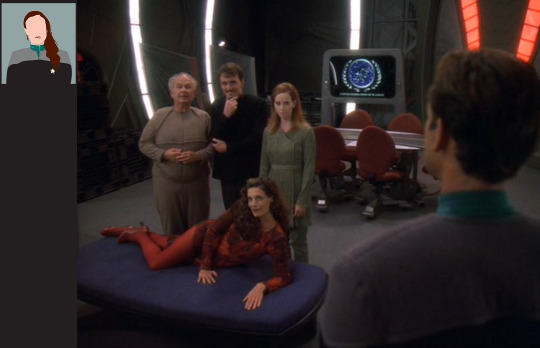
“Statistical Probabilities”: Ames How did Jack and the other genetically engineered mutants not predict this one: that their portrayal of people with mental health disorders was frankly appalling and they deserve to be at the bottom of the barrel where they can be jettisoned into space with the rest of the trash? Hmm?
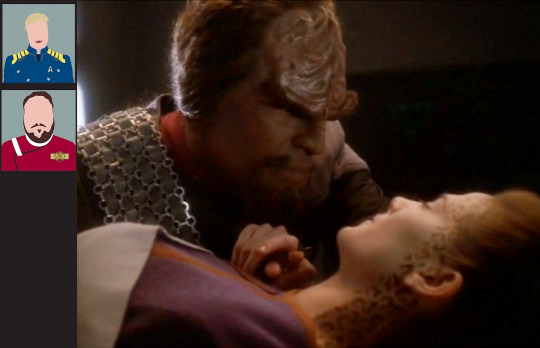
“Tears of the Prophets”: Caitlin, Chris Somehow way too much and way too little happen simultaneously in the season finale, leaving us bored and exhausted at the same time. Also, this is how they kill off a beloved main character? It felt like a cheap afterthought. Frankly, Tasha Yar had it better, and that’s saying something.
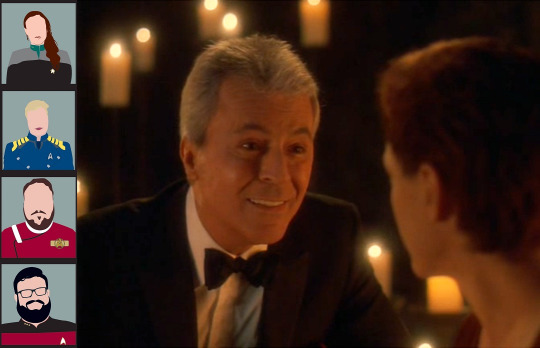
“His Way”: Ames, Caitlin, Chris, Jake When we vehemently beg for a B plot, you know something’s wrong. From the extremely toxic start of a relationship we honestly didn’t need, to the WAY TOO MANY SONGS, this musical episode just hurt us. Sorry, Vic Fontaine, you’re not turning this no into a yes.

“Profit and Lace”: Ames, Caitlin, Chris, Jake How do you possibly get worse than the misogyny in “His Way”? By trying to make rape jokes out of it. Ferengi episodes tend to poorly handle sensitive topics to begin with, but this one was so inexcusable that it might actually be the worst of all Trek. But don’t listen to me: I’m clearly just an emotional fee-male.
—
Top Three Episodes
On the flip side, there were also way more true gems this season than we were expecting as well, with some of the most well regarded episodes packed into a short span of time. What a ride!

“Inquisition”: Jake We see the dark side of the spy world in this riveting episode that pulls a new rug out from under us with every twist. Say what you will about Section 31 going forward, but its introduction was riveting, the mindfuck did not disappoint, and Luther Sloan looked damn good in that jacket!

“The Sound of her Voice”: Caitlin Where DS9 failed so utterly with Vic Fontaine, they capitalized with Captain Cusak: a character we don’t even see on screen and yet is so well developed, voiced, and portrayed that we too were immediately captivated by her. A resounding win for Debra Wilson (see what I did there?).

“Rocks and Shoals”: Ames While the big 6-episode war arc mostly blended together, the standout was “Rocks and Shoals” and meeting our new friends: the deliciously sleazy Vorta Keevan and the startlingly sympathetic Jem’Hadar Remata’Klan. How often do you actually root for Dominion soldiers to come out okay? Well done.

“Honor Among Thieves”: Caitlin More fun spy shenanigans and some genuinely touching scenes with O’Brien and his Orion handler Bilby: how can you go wrong? Miles is best when he’s outside his comfort zone and suffering, after all. And this episode gets many extra points for introducing our new favorite character, Chester!
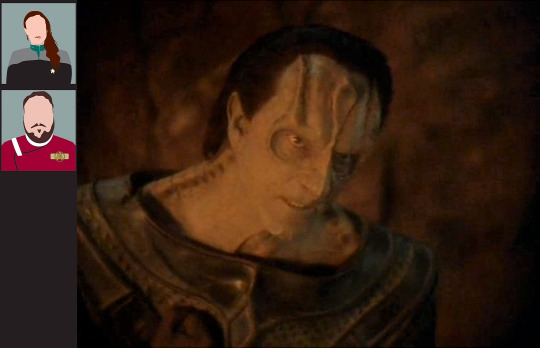
“Waltz”: Ames, Chris Marc Alaimo and Avery Brooks carry this episode all the way through space, into the caves, and out of all sanity. It takes some special skills to make such a talky, static plot feel so riveting, and they really made it an episode the likes of which the galaxy had never seen!

“In the Pale Moonlight”: Chris, Jake DS9 is at it best when it’s at its greyest, and Ben Sisko lives firmly in the grey. The impossible decisions made during the Dominion War stick with you well after the episode is over, churning around in your head until you have to make your own 2am log entry with a stiff drink in hand.
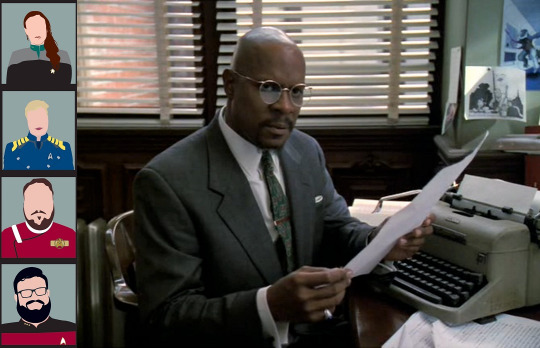
“Far Beyond the Stars”: Ames, Caitlin, Chris, Jake “Far Beyond the Stars” really breaks the mold for what Star Trek can be, and we were here for it! We can’t dole enough praise upon the acting, the directing, the design, the unconventional writing, the everything, but what brings it all home is a profoundly true core statement about racism that is still relevant today.
—
Only one season left of DS9, so keep your eyes focused on the wormhole for more from A Star to Steer Her By, listen to new episodes on Soundcloud, follow us on Facebook and Twitter, and remove about five songs from every episode going forward!
#star trek#Star Trek Deep Space 9#ds9#podcast#star trek podcast#top three#bottom three#times orphan#statistical probabilities#tears of the prophets#his way#profit and lace#inquisition#the sound of her voice#rocks and shoals#honor among thieves#waltz#in the pale moonlight#far beyond the stars
4 notes
·
View notes
Photo
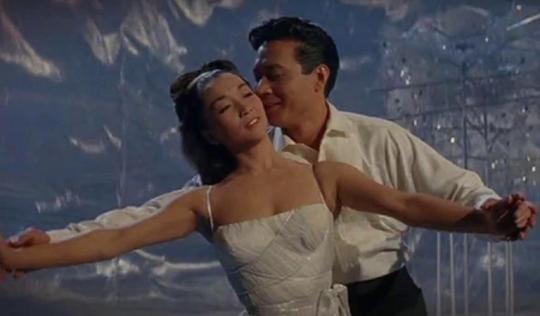
Flower Drum Song (1961)
M*A*S*H and Star Trek: The Next Generation have long been television favorites of mine. My parents introduced me to both shows – fixtures in American entertainment as Vietnamese refugee families fled to and renewed their lives in the United States. The writers of M*A*S*H, a show set during the Korean War, did not make it a secret that the show mirrored American involvement in the Vietnam War. M*A*S*H understandably focused its attention on its mostly white doctors, nurses, and non-coms. But from time to time, the show railed against war’s horrible effects on the local populace, on whose land such bloodshed is waged. In these episodes, M*A*S*H always cast Asian-American actors of varying ethnicities to play the Koreans (the value of these depictions of Koreans varies, but it is evident the all-white writing staff gave their best effort to portray Koreans in their full humanity). For a show that aired from 1971-1983, this was a radical decision as yellowface was still a widely-accepted practice in Hollywood. Star Trek, in its various incarnations, has espoused “Infinite Diversity in Infinite Combinations” from its inception. Numerous Asian-American recurring actors and guest stars of these shows have appeared in these shows I cherish (and many others) for decades. My memory flows with many of their faces and voices, even if I do not recall their names.
Adapted from C.Y. Lee’s novel of the same name, Richard Rodgers and Oscar Hammerstein II’s musical Flower Drum Song debuted on Broadway in 1958. The musical resembled nothing currently on the Great White Way, with an almost entirely all-Asian cast. Yet this musical still caused consternation. Some Asian-Americans expressed their rightful disapproval towards Rodgers and Hammerstein’s patronizing dialogue and racially insensitive characterizations. For this film adaptation by Universal (this is the only Rodgers and Hammerstein film adaptation without 20th Century Fox’s involvement), screenwriter Joseph Fields – who collaborated with Hammerstein on Flower Drum Song’s book – made major adjustments in order to stem controversy. Fields rearranged the plot and soundtrack and, most importantly, rewrote more than half of Flower Drum Song’s dialogue in order to accomplish a more respectful (if still imperfect) portrayal of all the musical’s characters.
The reworked Flower Drum Song attracted a star-studded Asian-American cast. So many in this cast are actors and actresses I have known only through their guest or recurring television roles, maybe the odd extra in a movie. To see them act in non-denigrating roles, sing, and dance in a major Hollywood studio feature film was revelatory. I admit, while viewing Flower Drum Song, feeling pangs of frustration over how Hollywood’s structural racism precluded too many in this cast from stardom. But that frustration was overcome by joy – a joy in seeing these Asian-American actors display their talents in a fashion I, even in 2020, long to witness. Though still constrained by Rodgers and Hammerstein’s stereotypical views towards people of Asian descent, Flower Drum Song is a unique cinematic experience.
Mei Li (Miyoshi Umeki) and her father, Dr. Han Li (Kam Tong) have stowed away on a ship carrying them from their home in China to San Francisco. The Lis are here to complete Sammy Fong’s (Jack Soo) request for a mail-order bride. Sammy is the slick-talking owner of the Celestial Gardens nightclub, who just so happens to be in a relationship with his principal showgirl, Linda Low (Nancy Kwan). So when the Lis arrive at the nightclub, Sammy realizes the pickle he has put himself in. In his attempts to dissolve the marriage contract, he has the Lis take up residence with the Wang family – including patriarch Wang Chi-Yang (Benson Fong), Master Wang’s sister-in-law Madame Liang (Juanita Hall, a mixed-race actor of African-American and Irish descent, in yellowface), eldest son Wang Ta (James Shigeta), and younger son Wang San (Patrick Adiarte). Secretly, Sammy has convinced Madame Liang to allow Mei Li to fall naturally in love with Wang Ta. Meanwhile, Linda is flustered with Sammy after learning of his mail-order bride plans. They separate, and she soon begins to start dating Wang Ta. Wang Ta is also the object of affection of childhood friend and seamstress, Helen Chao (Reiko Sato). If you could not guess by now, the plot of Flower Drum Song revolves around complicated relationship polygons.
Actors also appearing in this film are Victor Sen Yung as the Celestial Gardens’ emcee, Soo Yong as Madame Yen Fong (Sammy’s mother; this role was to be played Anna May Wong, but she died before production began), and James Hong as the head waiter at the Celestial Gardens. Virginia Ann Lee and Cherylene Lee play Wang San’s girlfriend and the Wang family’s youngest daughter, respectively.
In this rewriting of Flower Drum Song, screenwriter Joseph Fields, there is a greater focus on generational conflict. This film adaptation is unclear when the story takes place. But by looking at some of the technology and mannerisms, I will guess sometime after World War II, probably the 1950s. In this rendition of San Francisco’s Chinatown, first-generation Chinese immigrants live alongside the second and third generations. This mix creates a tension that permeates across the film – from how characters dress, behave in public (if they even go out in public) and private settings, and most notably romantic expectations.
The depiction of this tension is simplistic: those are not American-born uphold as many traditions as they can; those who are American-born are “Chinese” to some extent, but mostly do not think much about Chinese traditions. You are either assimilated into American society or not, says Flower Drum Song – a troublesome generalization that persists in Asian-American subgroups whose history in the U.S. is not as long as Chinese-Americans. But, in a rare instance for a Golden Age Hollywood film, Fields assures that this adaptation does not mock the first generation for not being as “American” as they could possibly be. Assimilation is on the terms of the characters, not contrived societal norms. Another anomaly in Flower Drum Song: the younger generations are assertively American, rather than offshoots of their elders. The younger generations’ unaccented English, wide range of characterizations, and their incidental Asianness (in that they do not feel the need to announce their Asian or Chinese heritage to others or to the audience) is unusual for the time in which this film was released. At the very minimum, Flower Drum Song tries to normalize Asian-American personhood. When the film fails to uphold that, it is mostly because of preexisting issues. In those instances, Fields cannot write his way outside how Rodgers and Hammerstein had already presented Flower Drum Song on the Broadway stage without compromising the duo’s artistic intent.
Many of the actors involved are not Chinese-American, but the performances are sincere, whether comedic or dramatic*. Having seen only a few of his works, I now wonder whether James Shigeta was just so naturally charming. As the go-to Asian-American romantic lead in Hollywood (not that he was cast in such a role often), his performance is seamless, appearing almost effortless. The same could also be said for Nancy Kwan, fresh off her well-publicized cinematic debut in The World of Suzie Wong (1960). An alumnus of the Royal Ballet School in London, Kwan also shows off her fancy footwork multiple times. Kwan’s dancing mastery is without question and, paired with choreographer Hermes Pan (best remembered as Fred Astaire’s principal choreographic collaborator), showcases her talents. As Mei Li, Miyoshi Umeki is slightly hamstrung by her role’s characterization. Yet as one of two actors who reprised the role they originated on the Broadway stage (along with Juanita Hall as Madame Liang; Jack Soo also appeared on Broadway, but switched roles), I was convinced by Umeki’s emotional fragility and shyness – all this for a character who has just arrived in a foreign land, bewildered by what she sees.
For the M*A*S*H fan in me, there is a special delight seeing Jack Soo and Patrick Adiarte here. Soo, best known as Det. Nick Yemana in the sitcom Barney Miller and for his distinctive face, is the natural comedian in the cast. His delivery – physically, verbally – is fantastic in this film. Adiarte, who also starred as Prince Chulalongkorn in The King and I (1956; I had not made the M*A*S*H connection when I watched that film four years ago) has a solo dance number (“The Other Generation”) in Flower Drum Song that I was floored by due to his athleticism.
As lead choreographer on Flower Drum Song, Hermes Pan directs several dancing segments for the film, each one markedly different from the other. The three most notable dance numbers are “Grant Avenue”; “Fan Tan Fannie”, “Love, Look Away” (the first two include Nancy Kwan; the other includes Reiko Sato and James Shigeta). Alongside the production design by Alexander Golitzen (1940’s Foreign Correspondent, 1960’s Spartacus); Joseph C. Wright (1942’s My Gal Sal, 1953’s Gentlemen Prefer Blondes); and Howard Bristol (1940’s Rebecca, 1959’s Anatomy of a Murder) and the costume design by Irene Sharaff (1951’s An American in Paris, The King and I), the dances are built for Technicolor – even though the film’s Chinatown looks too obviously like a soundstage construction. The abstractions in “Love, Look Away” offer the best example of this choreographic-production design-costuming collaboration. The use of empty space, props suggesting physical divisions and other people, and the enormous dreamlike atmosphere position the scene to be a cinematic manifestation of Helen’s unrequited love for Wang Ta (notably, the dancing segment uses the melody of a song not sung for Helen, but for another). In its ethereal beauty, “Love, Look Away” is a marvelous several minutes of cinematic dance – appearing in a decade where such scenes would only become more rare.
youtube
The order of the Rodgers and Hammerstein songs has been rearranged drastically from the original Broadway production; one song (“Like a God”) was dropped entirely because Universal’s executives, “feared that a number in which a Chinese American man compares himself to a god might offend audiences in the American South.” Whatever. The exclusion of “Like a God” does not affect the film much, as this adaptation of Flower Drum Song is a substantially different creature than the stage version. Owing to the performances, the two most notable songs of the musical carry over to the movie. The self-assured anthem “I Enjoy Being a Girl” (Nancy Kwan dubbed by B.J. Baker; Kwan did not protest the dubbing, despite the fact she could sing) may not contain Kwan’s singing voice, but it does boast her charismatic performance. In the film’s second half, “You Are Beautiful” has Shigeta’s and Umeki’s acting complement the former’s tender singing. But most of the songs – including two of the dance numbers when not considering the choreography (“Grant Avenue” and “Fan Tan Fannie”) – fail to leave an impression. Having Juanita Hall sing “Chop Suey” (an American Chinese dish) underlines the irony of having a non-white actor play someone of Asian descent.
In the Rodgers and Hammerstein repertoire, Flower Drum Song is among the least performed of their musicals. A 2002 revival with copious revisions remains the only production outside the musical’s Broadway and West End debuts – Flower Drum Song has not been on tour since the 1960s. It may not compare well musically, lyrically, and dramatically to Carousel, The King and I, or South Pacific, but it is miles better than the likes of State Fair. But the original production of Flower Drum Song, as written, is now considered offensive to contemporary sensibilities. As the preeminent musical theater compositional duo of their day (I would argue that they are the best in the medium’s history), Rodgers and Hammerstein – through The King and I and South Pacific and Flower Drum Song – intended through their stage musicals to break down the racial barriers that they abhorred. All three of these musicals incorporate ethnic and racial stereotypes that can never be stricken entirely from their film adaptations and subsequent musical revivals. Rodgers and Hammerstein’s intentions are well-meaning in their advocacy for cross-racial understanding, but their messages are muddled. Their work reflects a lack of racial sensitivity, at best.
The 1961 film adaptation of Flower Drum Song is the first major Hollywood studio movie to have a significant number of Asian-Americans as credited cast members since Go for Broke! (1951; a WWII film dramatizing the service of the 442nd Regimental Combat Team). Flower Drum Song ups the ante over Go for Broke! as it has an almost all-Asian cast – a feat not replicated again until The Joy Luck Club (1993) and then Crazy Rich Asians (2018). The environment in 1950s and ‘60s Hollywood excluded Asian-Americans in front of and behind the camera, so I can understand why there are only two films from that era with a majority-Asian cast. But I grade on a temporal curve. There is no excuse in modern Hollywood for the twenty-five-year separation between almost all-Asian casts. Are we to expect that the only Hollywood movies with nearly all-Asian casts/majority Asian casts in the future will be the sequels to Crazy Rich Asians?
For the longest time, Flower Drum Song was the one major Rodgers and Hammerstein musical I knew least about. I suspect, of the duo’s musicals that have been revived, it is the one in their repertoire that even self-professed theater buffs are least aware of. Being the only Rodgers and Hammerstein musical not distributed by 20th Century Fox does not help. Nor does the fact that its last home media release was on DVD in the 2000s. In 2008, Henry Koster’s Flower Drum Song was inducted into the Library of Congress’ National Film Registry. That honor marks the film as integral to the history of American cinema. As the constant writing of American cinematic history continues, as audiences become attuned to the history of non-white individuals in Hollywood, perhaps more people will see the importance of this movie. What would have happened if James Shigeta, Nancy Kwan, Miyoshi Umeki, Jack Soo, and their other co-stars were offered the same quality of opportunities of their white colleagues? We will never know. But Flower Drum Song can help the viewer envision the answer.
My rating: 7/10
^ Based on my personal imdb rating. Half-points are always rounded down. My interpretation of that ratings system can be found in the “Ratings system” page on my blog (as of July 1, 2020, tumblr is not permitting certain posts with links to appear on tag pages, so I cannot provide the URL).
For more of my reviews tagged “My Movie Odyssey”, check out the tag of the same name on my blog.
* My sister will tell you that she does not believe that anyone in this film’s love polygon has a genuine mutual love. I agree. Mei Li’s love for Wang Ta appears genuine, but that is the extent of it.
#Flower Drum Song#Henry Koster#Nancy Kwan#James Shigeta#Miyoshi Umeki#Jack Soo#Benson Fong#Juanita Hall#Reiko Sato#Patrick Adiarte#Richard Rodgers#Oscar Hammerstein II#Rodgers and Hammerstein#Joseph Fields#Russell Metty#Irene Sharaff#TCM#My Movie Odyssey
7 notes
·
View notes
Photo
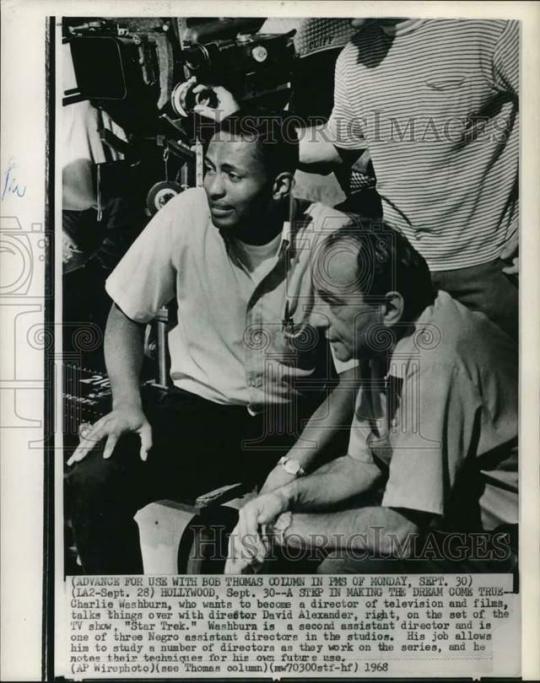
So whose job was it to cast all those redshirts (and stunt people) we celebrate here? Who figured out which actors were needed for each scene, which extras needed to be hired (and how much they would get paid) and which props were needed for each scene as it was filmed, in addition to the distributing copies of the scripts to all and sending them updated scripts as needed along with what time everything had to be in place for the cameras? All of these duties and more are usually the job of the second assistant director. The Star Trek set (and those of most television series) needed more than just the main director or even the first assistant because several scenes were usually being filmed at the same time. One of the most personable and popular second assistant directors who worked on the set of The Original Series was a young man by the name of Charlie Washburn. He was also known as “Charlie Star Trek” because one of his duties was to answer the phone on the set. When it rang, he crisply answered “Star Trek - Charlie!” The crew began calling him Charlie Star Trek and it stuck as long as he worked there. The Tennessee native originally wanted to break into writing advertisements. During the the two year program he had entered in Milwaukee, he happened to take a course in television. Charlie became fascinated with all the details of a director’s work and decided that was a far more interesting field. Even though he first began looking for work in television in Chicago and New York (more about that later), he eventually decided to come to Hollywood and enter the Directors Guild program and was accepted.
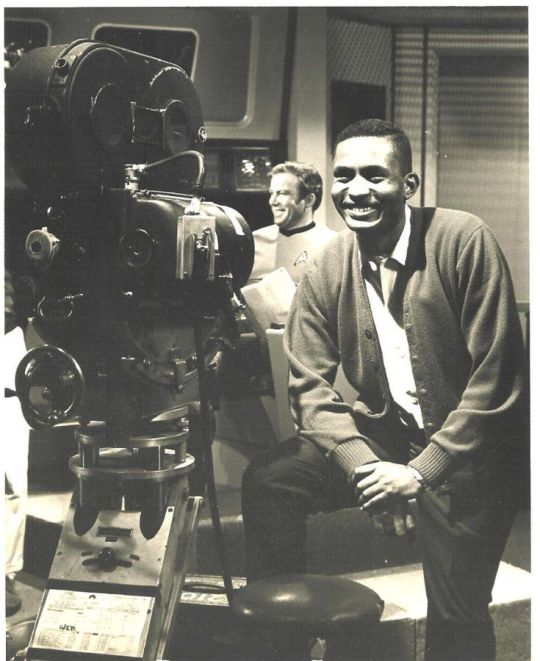
But before he could graduate, he had to served as an apprentice on an actual set. Luckily for Charlie, he was hired as a trainee on Star Trek for the second season. During his trainee period, he worked under assistant director. (Shapiro had previously worked on My Favorite Martian where he met Billy Blackburn and later he brought him on board The Original Series). Charlie enjoyed Tiger’s sense of humor and learned a lot about making personal connections with both the cast and the crew in addition to all the other duties a second assistant director needed to master. Tiger allowed him to gradually take over more and more of his duties as long as Charlie cleared any changes first. He ended his apprenticeship with over 400 hours of training.
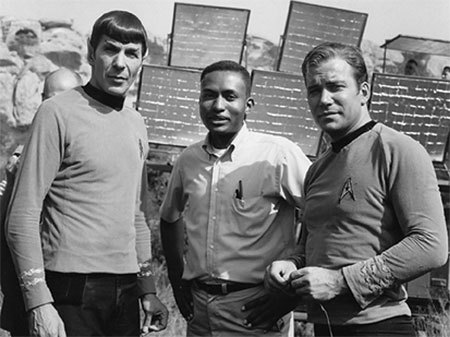
Charlie Washburn graduated at the top of his class, so he did not have any trouble finding work. Star Trek immediately hired him back as a second assistant director. As mentioned previously, the show always needed two second assistant directors so Washburn was able to work alongside his former mentor, Tiger Shapiro, during the third season.
D.C. Fontana interviewed Washburn and another production crew member for an article for Inside Star Trek. Charlie provided many details about his work that he enjoyed, but he said one of the duties he dreaded were the firings. The decision was not his of course, but would get handed down from the producer’s office and it was up to one of the assistant directors to handle the firings professionally. Charlie was involved in the aftermath of the firing of one of the Earp brothers on the set of “ Spectre of the Gun.” Even though someone else had already informed the agent and the actor of the situation, that meant they had to hire a replacement and that was one of the duties of the directors team. When the new actor appeared on the set, Charlie realized he knew him and helped him make the transition as smooth as possible. Although he never mentioned the name of the actor himself, it was later disclosed by Memory Alpha that it was Rex Holman, who played Morgan Earp.
He was always proud of the relationships he had on the set, from the directors on down to the stage hand and electrical workers. Charlie was known and loved by everyone for both his courteous manner and his professionalism. In an article that appeared on the Directors Guild online quarterly newsletter, he was quoted as saying -
"Not a single day passed by that I didn't greet every single crew member by name and ask about their families," he shares. "I'm proud to say I was the first AD to be goosed by an electrician on Star Trek when I was up on the rigging one day putting together the call sheet. After it happened, [gaffer] George Merhoff smiled and said: 'Hey, Charlie. Now you're part of the group.'”
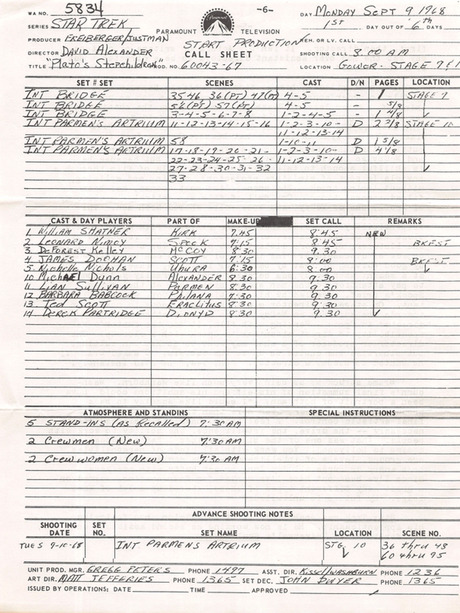
For the same Inside Star Trek article, Washburn submitted one of the call sheets he had written up for a scene in “Plato’s Stepchildren.” This gives the readers an inside look at how much attention to detail a second assistant director had to have as he read the script each day. He needed to be able to anticipate who was needed when and where they needed to be, including make-up call times. Notice since Nimoy, Doohan, and Nichols were the ones who had to be in makeup the earliest, there is a notation in the special instructions that they will be given breakfast that morning. If anyone in the main crew or the guest star had to be on the set at or earlier than 7:30 a.m., that meal was provided. Speaking of breakfasts, providing them (and sometimes delivering them in person) to designated actors was one of Charlie’s duties as a second assistant director. And he had a funny story for that article about the particularly large one that Bill Shatner always ordered. It seems that in contrast to the usual order of one or two eggs, toast or maybe just yogurt, Shatner’s standing order consisted of two scrambled eggs, bacon, grapefruit, wheat toast and a large orange juice. Evidently, unit manager Greg Peters was trying to contain unnecessary costs as much as possible. When he saw the size of that order as compared those of the other cast members, his immediate question was why did Bill need that much for breakfast? Charlie told him there was no way he was going to ask Shatner that question but Greg was welcome to try. And of course, Peters was as reluctant as Charlie was to ask, so he dropped it. But Charlie knew the real reason. Shatner ate the toast and drank the orange juice, his wardrobe man was given the half grapefruit. The rest? That went to his Doberman. Imagine Greg Peters’ reaction if he only knew.
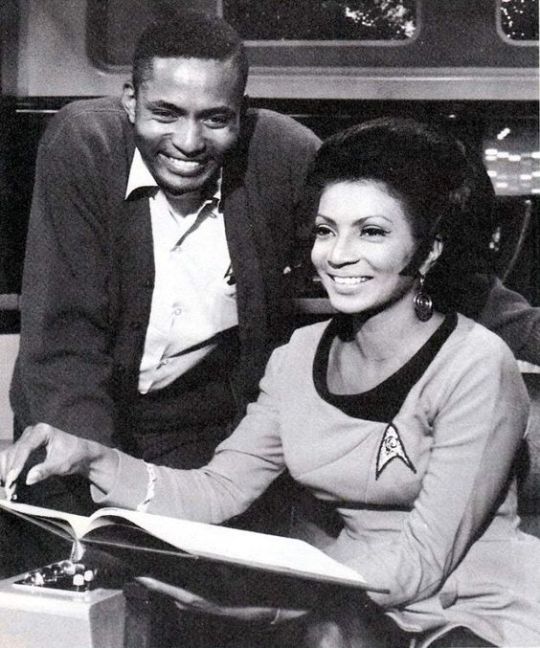
Charles Washburn and Nichelle Nichols were hired during the tumultuous period of the Civil Rights movement of the 60s and the expansion of opportunities for minorities was in its infancy. Charlie often mentioned in interviews that when he first started working for Star Trek in 1967, there were only three black people who were usually on the Desilu set. Himself, Nichelle Nichols, and the guy who ran a food truck in the morning and shined shoes on the lot in the afternoon. Even though he claimed he rarely saw racism on any of the sets he worked on after graduation, Washburn admits it did exist during his time growing up in Tennessee. And an incident in Chicago when he first began looking for AD related work also illustrates the racial bias of the times did not only exist in the South. Some production friends encouraged him to apply for an opening at an NBC affiliate because he was told they were specifically looking for a black in the control room. With high hopes, he went in for an interview, but never heard back. Months later, he called one of those production friends to find out if the job had been filled. He was told no one had been hired. The studio just wanted to be able to say they were encouraging blacks to apply. That was the impetus for his move to Hollywood and his application to the Directors Guild program. Charlie distinguished himself as the first African American to apply and graduate from the program.
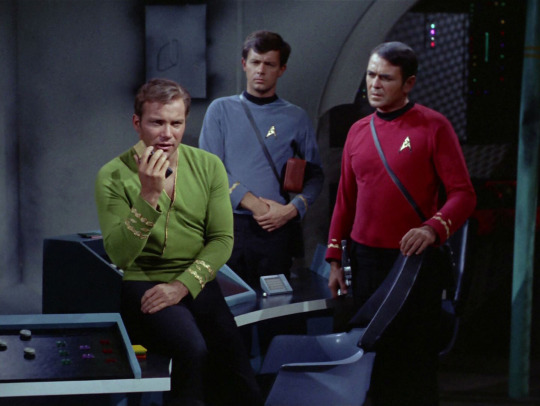
Charlie even has a Trek crewman named after him. In “The Doomsday Machine,” we see Lt. Washburn (the science officer above) as part of the landing party investigating what happened to the Constellation. He and two others ran a structural and control damage analysis of the disabled ship, then he was the one who delivered the report to Scotty and Kirk. Coincidentally, Richard Compton (who played Washburn) directed The Next Generation episode “Haven” with Washburn as his first assistant director.
In the latter part of Star Trek’s third season, Charlie received an offer to work on a movie in Jamaica. If he were to stay on until the end of the season, he would miss out. He did the honorable thing and told Gene about the choice he had to make. Gene encouraged him to take the movie offer with his blessings. He told Charlie that if he really thought Star Trek would be renewed for the fourth season, he would not have done so. Gene graciously thanked him for all his contributions.
But his contributions to Star Trek did not end there. Years later, Washburn was one of the production people asked for by Gene Roddenberry to work on his new series, The Next Generation. He served as a first assistant director during the first season. Washburn stayed connected to Star Trek even later, although it was an unofficial Trek fan production. He was hired to work on James Cawley’s Star Trek: New Voyages as the first assistant director of the double episode Blood and Fire which was written by David Gerrold.
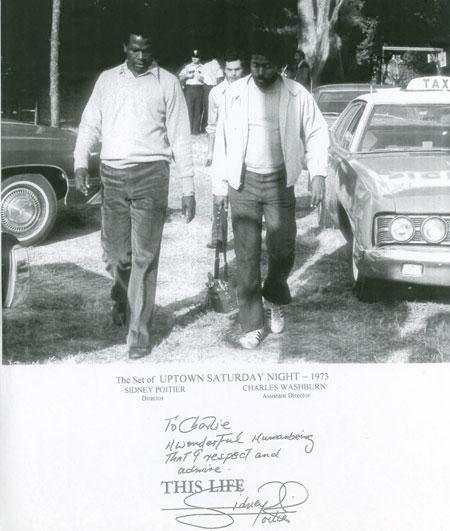
After The Original Series ended and his work on that film was finished, Charles Washburn was hired for The Bill Cosby Show as a second assistant director for 19 episodes, then as first assistant director for 16 more. Other TV shows he worked for as a first assistant director were Vega$ (9 episodes) and of course, the previously mentioned Star Trek: The Next Generation.
Charles Washburn also found steady work on movie sets as either a second or first assistant director, including such well known films as Dirty Harry, Sounder, Lady Sings the Blues, and Uptown Saturday Night (as seen above with Sidney Poitier). He was a unit manager for 6 episodes of McMillan and Wife and 2 of The Six Million Dollar Man as well as for the movies Bustin’ Loose and Fly Away Home. Charlie also was the associate producer for one episode of Get Christie Love! He even had a few acting roles squeezed into movies or TV shows he worked with. He was a Papuan in one of his earliest movies, Skullduggery (where he also appeared with Roger C. Carmel) and an intern in Dirty Harry.
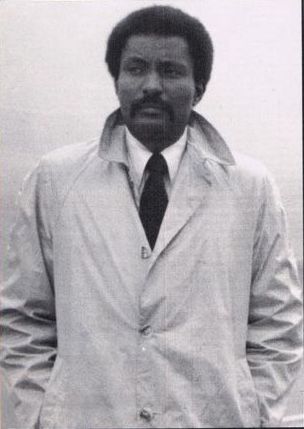
But remember his ultimate goal was to be a director. Yet, for all his experience, he never achieved this position. Washburn explained in the Inside Star Trek article that even though it was possible for second assistant directors like him to eventually advance to be an assistant director and then be hired eventually as a director, that was not the only path. Actors often used their own experiences and their relationships to their directors to learn how directing was done. And if someone were highly acclaimed as an actor, name recognition would open many opportunities to leave acting and to immediately begin directing. So progressing from second assistant to first assistant director did not guarantee that person would be hired as a director.
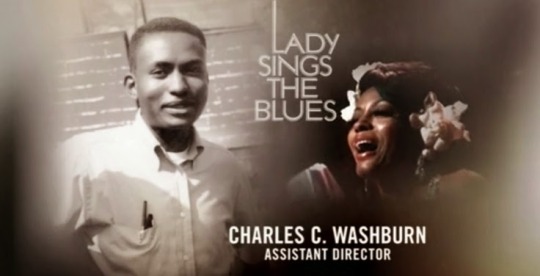
Charlie’s last years were spent at the Screen Actor’s Home in a small apartment. His good friend Larry Nemecek helped him move. But Charlie stayed as active as possible, considering his kidney dialysis treatments. He organized screenings and shows for the residents there as long as he could. But Charlie lost his battle with kidney disease at age 73. Larry Nemecek wrote a very nice memorial article on his blog, complete with some personal photos. Ten months later, Larry Nemecek was contacted by the people responsible for the memorial reel at the Oscars. He handed over all the personal photos he had of Charles Washburn. However since this was for the Oscars, nothing from the years of his work on Star Trek was mentioned. The team decided to use a short clip from Lady Sings the Blues where Charlie was the assistant director and a photo Larry sent in of Charlie sitting at his desk, overflowing with papers and other mementos. The above photo is a clip from that tribute.
762 notes
·
View notes
Text
Whither Jonny Quest?
NEWS ITEM: Wisconsin Public Radio recently cancelled a twice-each-weekend anthology of Old-Time Radio programmes after a review found that many of the shows featured, some going back over 60 years, contain “problematic content” vis-a-vis race and gender depictions that would not be suitable under current circumstances.
ANOTHER NEWS ITEM: Disney has announced that it’s reassessing plans to produce a movie based on the Jungle River Cruise attraction at Disneyland and Walt Disney World out of concerns that the attraction’s backstory tended to racism excusing insensitivity to indigenous peoples and cultures.
*************
There can be no mistaking the obvious: Recent Unfortunate Events have laid bare and open to the naked light of Truth and Reality the debauched excesses of White Euro-Christian Colonialism and its promotion of “Civilisation” unto what were long seen as “uncivilised” societies and peoples. Often using religious missionaries as a vanguard, such peoples were looked upon in crass and crude contexts having no regard for their traditional ways, such needing to be “civilised” per the White Man’s Burden--more often than not involving fear, coercion, enslavement, deliberate spread of diseases and illnesses heretofore unknown unto them, rape and sexual coercion thereby reducing such once-proud peoples to shells of their former selves who “needed to be kept in their rightful place,” more often than not as inferiors.
Already, the British, Dutch, French and Belgians have begun coming to terms with their legacies of colonialism in the Caribbean, Latin America, Africa and Oceania, and the wrack and ruin wrought upon subjugated peoples and lands. (Lest we forget, we Americans as are otherwise expected to see ourselves as Morally Superior to All Others by Divine Right and Will had colonial misadventures of our own in the Philippines between 1899 and their being given independence in 1946, justified by claims, for example, that indigenous Malay peoples were “filthy” and “had no regard for personal hygiene.”)
*************
I mention this inasmuch as the Hanna-Barbera-produced potboiler adventure series Jonny Quest (which aired in prime time on ABC in the 1964-65 season and would later see Saturday-morning runs on the then-three dominant networks), itself influenced by the classic radio juvenile adventure series Jack Armstrong, The All-American Boy (which aired on CBS and the NBC Blue Network [now ABC] between 1933 and 1951 in the after-school block commonly used for children’s programmes), might have some episodes from the original run which might contain problematic content vis-a-vis the issues just addressed, especially when such subjugation of indigenous peoples and lands under the guise of “civilisation” is seen as glorious or otherwise heroic and worthy of study and emulation. Such, obviously, needing to be viewed in the context of the mid-1960′s when such were originally produced, as well as the influence of Jack Armstrong (which, incidentally, Hanna-Barbera wanted to bring to television; General Mills, as still owned the rights in the series, was unwilling to sell them).
(Particularly interesting about Jack Armstrong was that among the announcers on the Chicago-based series during its run were Tommy Bartlett, later synonymous with that waterski show in Wisconsin Dells ... and Franklyn MacCormack, whose Meister Brau Showcase of music and poetry readings over the 50-kW airwaves of WGN Radio in Chicago was a late-night legend from 1958 until his on-air heart attack death in 1971.)
*************
It’s my understanding that one episode of Jabberjaw has been pulled from the canon after it emerged that its story contained offensive depictions of Chinese persons, even for Saturday-morning television in the mid-1970′s (when we thought we had learned the lessons of using Fu Manchu and Ming the Merciless as template for depictions of the Chinese in popular culture).
With that in mind, perhaps a review of the original run of Jonny Quest might be in order to see if such might have content likely to raise issues making light of the ill-treatment of indigenous or otherwise “backwards” peoples under the banner of White Euro-Christian Civilisation, even if science had to be served--even if, in the end, it’s likely that videos will likely be prefaced with a warning that such contains offensive depictions which were considered acceptable when they were produced originally, and should be seen in that context.
*************
But then again, I happen to have imagined in the case of Peter Potamus an Alternate Universe (AU to the fandom community) which has him being rather fond of a number of remote and uncharted island communities across Polynesia which have never seen the Destructive Impacts of Civilisation--and the natives, “naked as nature intended” for the most part, actually prefer it that way. A fondness going back to Peter’s late father, Perry Potamus (himself somewhat eccentric and yet fond of wanderlust, eventually instilled in his son), on numerous expeditions in that Magic Balloon forever associated with Peter Potamus “himself.”
And considering the rather sensitive nature of such peoples, Peter Potamus prefers to keep such knowledge of Uncharted Polynesia and its peoples and ways close to him and a few trusted friends--not to mention several privately-circulated volumes recounting his experiences among such otherwise interesting peoples. (But still, suffice it to say that the natives of Polynesia Uncharted, in their nakedness, enjoy swimming, diving underwater and surfing thus--dictated more out of comfort and closeness to Nature than any erotic intentions some might be thinking.)
In like vein, 3400 Cahuenga’s hybrid of Smurfs and The Dukes of Hazzard, as in Trollkins, I like reimagining as one which has Trolldom resident in the orisons of Trolltown and surrounds being closer to the trollditional lore which sees Trolls as being one with, and especially close to, Nature, in a sort of Zen-like approach that one fellow Hanna-Barberian described as “Dukes of Hazzard meets J.R.R. Tolkein”--rather whimsically amusing in its own way, yet not sinking to the stereotypical lows of “hicksploitation” films from the 1960′s and 1970′s as would sometimes incorporate country-music-related subplots vis-a-vis Southerners of a certain class. (As in imagining such Trolls having indirect fondness for outdoor sporting which can introllconnect with the natural such expected of Trolldom--backpacking, tent camping, trekking, canoeing, kayaking, diving underwater, that sort of thing.)
@warnerarchive @hanna-barbera-land @warnerbrosentertainment @hanna-barberians @fini-mun @themineralyoucrave @joey-gatorman @screamingtoosoftly @dinobirdy @hanna-barbera-blog
#editorial#musings#hanna barbera#jonny quest#evils of colonialism#colonialism#legacy of colonialism#white man's burden#jack armstrong the all-american boy#what are we teaching our children#call for reappraisal#alternate universe#jabberjaw#peter potamus#polynesia uncharted#trollkins#troll aesthetic#troll religion#hicksploitation#hannabarberaforever
7 notes
·
View notes
Text
A Sort of Hiatus on Canon Related D:BH Content
I said as much on twitter, but here I’ll go into a little more depth about why I’ll be sticking with AUs. This is a personal post, and I’m not speaking for anyone else. Minor edits added to fix my failures at English.
I do enjoy Detroit: Become Human. It’s never been great. It’s always struck me as sort of that gloss of tonedeaf some 90s Star Trek: TNG episodes had, where the characters were good but the plot would be some sort of fumbling social commentary that was very awkward and sometimes uncomfortable (See “Code of Honor” or “Journey’s End”). Every decision course of D:BH either has that vibe or if you choose more aggressive, less sympathetic routes some sort of mediocre early 2000s AI style android movie feel.
With a sort of detachment, that’s easy to watch. That’s the reason why “coded” things can often have a sense of lingering popularity even where representation is important. Someone who is ‘queer-coded’ or ‘autism-coded’ or “race-coded” can often be watched no matter what’s going on in the real world without sparking a sense of real world trauma so long as there’s a safe degree of separation. It can be imported and exported to places where certain subjects are forbidden. It can usually be enjoyed without provoking a sense of anxiety but also being relatable.
Of course this can go the opposite way, too. Until very recently, Destiny was pretty cut and dry on its “shoot the alien invaders even after we establish a ‘not all invaders’ standard.” Sort of a bad scene after you realize races like the Fallen are actually refugees from the same thing that’s happened to humans. They’re described as ‘nomadic’. But no, they lost their home. They’re searching for a new one. They’re refugees. Emperor Callus is seeking more territory but being cooperative and negotiable in contrast to other Cabal, and his people only attack you when you attack his. But it’s so masked in bug people and space rhinos that it’s easy to wave off. Only recently have we, in game, actually started questioning the good guys and how good they are.
Metal Gear Solid has its own coding, too. It’s thinly veiled, usually exploitative towards women especially, but the one thing that Kojima very much got right was its respect for painful international history. If you listen to any amount of radio recordings from most of the latter games, like Kaz’s briefing files in Peace Walker or calls with Para-Medic in Snake Eater, you will see an intense respect for actual harsh pasts and the real history that leads to these campy, fake futures and nonexistent conflicts.
Now that brings me back around to D:BH.
Detroit: Become Human is not as separated from reality as it should be for the sake of its subject matter. There’s not enough stated awareness about the real past while it aims too close to current social circumstances with its android plot arc. You get a short comment made by Rose Chapman about the history of the underground railroad and then passionless meanderings in potential world-establishing futures in found news articles and on TV. There are various holocaust/nazi themed shapes in designs and grim ideas/plot angles used in reference to fictional androids and not the real people that suffered because of them. They’re left like Easter Eggs and not meaningful commentary. There are riffs of actual symbols from the ‘android lives matter’ flippant remark from Connor to the tacky uses of slavery-related song. Hank’s suicidal ideology was depicted as unique when more cops die by suicide than in the line of duty. There are authority figures meant to be as bad as the ones being protested that, yeah, get what’s coming to them, but there are cops that fearfully react and kill androids and you’re meant to be sympathetic to them.
There’s enough realism there to hurt and right now it can’t be handwaved away. It’s salt in an open wound rather than being an overly optimistic mild embarrassment. There are problems enough that if the actors didn’t do so well with their material and with improvising, it’d be intolerable.
I will likely continue to draw Hank and Connor along with the other stuff I draw with that awareness because I love redemption arcs. I need redemption arcs and I love Clancy Brown who is a good soul. Most important to me is the treatment of depression in D:BH. So far it’s been the only game that has gotten depression and suicidal ideology in such a way that I completely identify with and relate to. But I can celebrate that in a context that’s not a landmine of badly depicted tonedeaf reminders. Right now, no better than an interpretive dance of mourning or offering someone a pepsi to end racism.
So for the next few weeks if I draw them I’ll be using AUs, probably. If anyone is interested, reverse AU plot is a corruption conspiracy plot where Hank’s memories were put in an android and sparked a little at a time, monster AU is him as a werewolf that hunts other monsters, and I very recently posted my Fallout AU rundown.
#text post#if you want to avoid just blacklist the tag#dbhhidden#i'll label everything with that#you can always blacklist by ship name too#i use those more often than canon names#important message from the BinkysaurusRex
11 notes
·
View notes
Photo

Anon I’m ASSUMING that these are from the same person; apologies if they are not
I would say that my feelings are similar to yours, but not quite identical ...

Disney’s handling has been imperfect, and some of the mistakes have been made the highest level (I know that people give Kathleen Kennedy a hard time, but if rumor is to be believed, some of the interference that made IX kind of weird came from higher than that)
for example, Kennedy said in an interview that she tries to find people who just make big, successful movies to make sure that these are also big, successful movies. I can understand that as being a safe bet from a business stand point, but that’s not the same thing as finding someone passionate about very specifically telling good, new Star Wars stories, which we did not really get in the Sequel Trilogy
(one of the most common theories that I saw from TLJ apologists was that people didn’t like that it was new/different than what they were expecting, which was really not the issue for me or my friends. Also it was just a speedrun of parts of Episodes V and VI)
I think that I’m “too close” to Star Wars to see it as a financial asset rather than a beloved universe full of characters and stories that I adore, but I don’t think that “literally just rehash the Original Trilogy for two movies and barely acknowledge any other part of Star Wars until IX” was a good idea
Rey deserved her own story. and Luke deserved to not be retroactively robbed of his
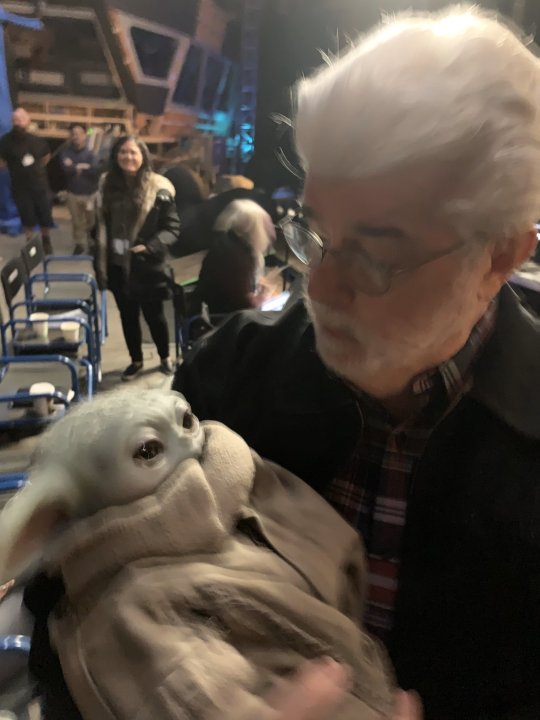
as for George Lucas, I do think that years of backlash over the Prequels sucked the fun out of it for him. Also, who doesn’t want four billion dollars? it was a sweetheart deal for Disney, of course
the sad thing is that this meant the end of Clone Wars, because Disney took one look at Lucasfilm’s budget and was like “OH NO YOU CANNOT SPEND THAT KIND OF MONEY ON A CARTOON” which is why Season 6 was paid for by Netflix and why Maul: Son of Dathomir was a comic
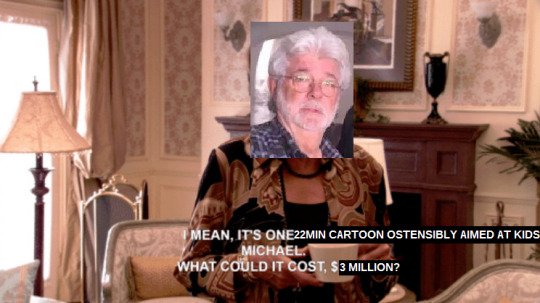
I love Star Wars Rebels and I’m not trying to knock the show at all, but the budgetary difference was palpable. Clone Wars did have it a little easier because of the Clone Troopers (all having the same face), but on Rebels, you notice that 90% of the Imperials are the same guy wearing a hat with his visor obscuring most of his face. market scenes show just a few people (but plenty of Storm Troopers)
the designs of the main characters -- Ezra, Hera, Sabine, Zeb, Kallus, Thrawn, Kanan, etc -- are great and loving and detailed and most of those change a little over time, but there’s a reason that we only see so many planets on Rebels. look at the huge armies and crowds in Rebels. my friend @drunkkenobi is the first who pointed out to me that in Clone Wars, you sometimes see lines of ships (Space Traffic) and each ship in line will be unique, distinct from the others
it’s not Rebels’ fault that they didn’t have that kind of budget. that’s also why their space battles (and space ships) never quite look right. meanwhile, for Clone Wars, if they wanted a particular scene or ship that went over their planned budget, all that they had to do was ask Uncle George

eccentric billionaires funding expensive media isn’t necessarily the most sustainable model for storytelling, but it sure worked out well for Clone Wars and for The Expanse
(Jeff Bezos personally called up the head of Amazon Prime programming, who had already been considering acquiring the extremely good but expensive show, and was like “hey the cast from this show is at a thing where I am, I’d love to just tell them that their show is saved, give me it?” and we saw as many new locations in Season 4 as we did in the first three seasons)
but streaming -- where you actually get money directly from customers who then, through their activity on your platform, show you exactly what they want to see aka what is keeping them on your platform -- offers a new opportunity for high quality genre media. remember, scifi and fantasy were EVERYWHERE in the ‘90s and the early aughts, and then because too expensive for regular TV unless they had huge audiences. only through streaming do we have these new Star Treks, The Witcher, and the real possibility of a new Stargate series
why do I bring up streaming? because
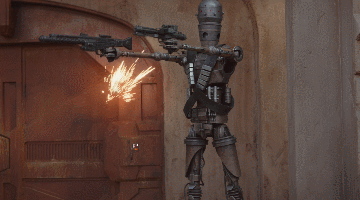
The Mandalorian goes to show that Disney can 100% do good Star Wars. Rebels was good, despite its budget, but can you imagine how much better it would have been if it had aired on Disney+
as with the DC movies (three of which are good and I’m also excited for Birds of Prey), the solution to the our-movies-made-a-lot-of-money-but-aren’t-strictly-speaking-good is literally just “let the people who do the cartoons make the movies”
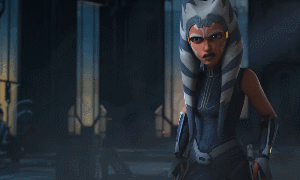
and now we’re getting a final, seventh (half) season of Clone Wars! twelve episodes looking better than the show has ever looked!!
if you’re like me, you probably thought to yourself “gee, only 12?” and, cynically, you figured that it’s a trick -- announced at ComicCon in 2018 to build up the first wave of hype for Disney+
and it is ... but it 100% worked on me, I signed up for Disney+ and will pay anything for Clone War
my HOPE is that this is a test run to see if people really like high-quality animated Star Wars stories enough to continue with it. there’s only so much clone wars that one can cover (my suspicion is that we will see Ahsoka fake her death during Order 66 in these eps, so yep, that’s the end of the Clone Wars right there)
imagine a well-written series with everything that Clone Wars had in terms of content and visual quality, but it’s set after Episode IX. to my frustration, IX ends with effectively the same worldstate as VI which essentially means that nothing much happened in the Sequel Trilogy. but imagine a series set after IX. we could see a new set of (Force-wielding) characters. we could see Rey, Finn, Poe, and Rose during some episodes. Rose could finally get to do something that’s not an insulting fool’s errand (she deserves so much better!!!!!)
we don’t need a new Big Scary Empire/First Order thing, just organized crime and pirates and Hutts and bounty hunters and individual planet systems going to war as the characters try to assemble a NEW New Republic (gods I hate the unchanged worldstate)

now, I know that Star Wars Resistance is not ... reassuring. this is the only screencap that I have from it because I couldn’t get into it. it’s not the animation (I enjoyed Tron Uprising and Iron Man: Armored Adventures and this is the same kind of deal), but three things:
-I watch Star Wars for the Force primarily; other stuff can be cool but I need the Force
-I will never care about ships racing and really I don’t care about an individual ship flying; I’m a Command Ship kind of space nerd
-apparently the writing doesn’t improve much during the first season. people tell the main character to not do something, then he does it, and disaster ensues. that’s ... it’s fine, it’s fine to exist as a show, it’s just not for me
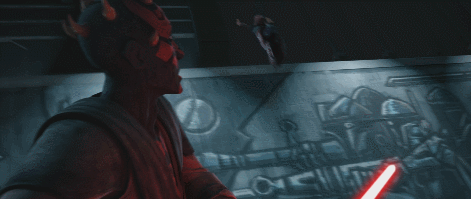
obviously, not all Star Wars media is for me, but when something -- like TLJ or the Sequel Series as a whole (even though VII and IX are enjoyable) or Resistance -- disappoints me, I would never accuse it of “ruining Star Wars”
Star Wars is a whole franchise. the breadth of canon isn’t all wiped away by some disappointments. was the MCU ruined by Age of Ultron? no. it was a bad movie but from the same franchise that gave us The Winter Soldier and Thor Ragnarok. hell, Dawn of Justice doesn’t “ruin” Wonder Woman or Aquaman or Shazam. bad movies aren’t contagious
for the past several years, the Entitled Dude crowd has felt empowered. they were radicalized in the altright/redpill/MGTOW/meninist/nazi/gamergate/comicsgate/etc spheres of the internet and now they just have a reflex where they see any sort of representation and decry it as “SJW,” which they also seem to think is a bad thing
in the same way that well-meaning people on tumblr can get radicalized into being antis/puriteens, people with certain vulnerabilities on reddit or youtube can get sucked into a world that tells them that they are the default and that other people existing is “political” in media and in real life, and that people being upset by outright cruelty towards them is both funny and means that the cruel person is the victor. they need therapy and studios need to not listen to them
unfortunately, sometimes there are movies that are bad despite having things like solid representation. Ghostbusters 2016 was a delight, but my friends and I with whom I saw TLJ (all of us queer feminists) left the theater angry. we’ve bitten our tongues a lot (even if it seems otherwise) because publicly criticizing the film too often leads some incel monster to chime in with agreement, and we’re just like

the redpillgate crowed et all is a natural ally of conservative white evangelicals, even though the former group is generally made up of New Atheists (the short version is atheists who hold socially conservative views because racism/misogyny/transphobia benefit them without using christianity as an excuse). it’s kind of like how terfs will side with conservative hate groups because, though they’re natural enemies, they both despite trans people just for existing
unfortunately, when you’re looking at who went to see a movie or who hated it, not everyone posts with an ID card saying exactly their demographic. which is only going to make studios like Disney even more nervous about including queer content in Star Wars and in the MCU (I mean real queer content with characters whose names don’t have to be searched on a wiki)
that was a bit of a tangent, but yeah. sorry if I missed anything
14 notes
·
View notes